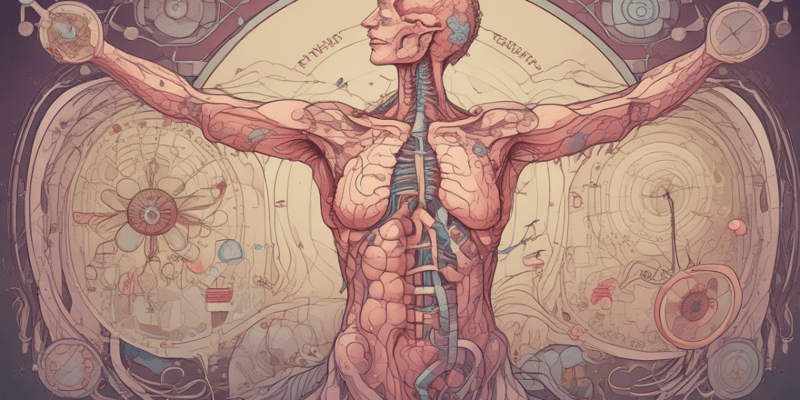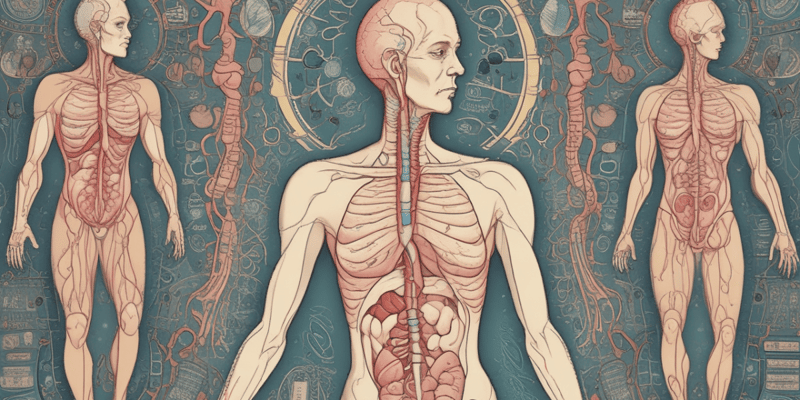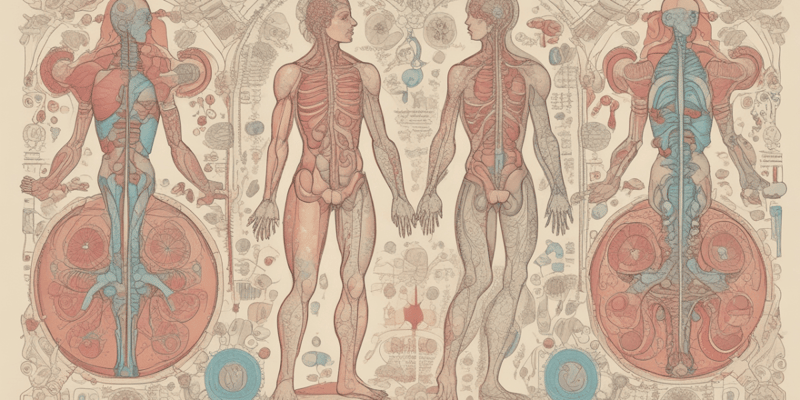8 Questions
What is the primary function of hormones in the body?
To regulate various bodily functions
What type of hormone can diffuse through cell membranes?
Steroid hormones
What is the mechanism by which hormones inhibit their own production when levels are high?
Negative feedback loop
Which gland regulates growth and development, and stimulates other endocrine glands?
Pituitary gland
What is the term for an underactive thyroid gland?
Hypothyroidism
What type of hormone is insulin?
Peptide hormone
Which gland regulates reproductive cycles and puberty in females?
Ovaries
What is the term for insufficient sex hormone production, leading to reproductive issues?
Hypogonadism
Study Notes
Definition and Function
- Hormones are chemical messengers produced by glands in the endocrine system that regulate various bodily functions.
- They are transported through the bloodstream to reach their target cells, tissues, or organs.
Types of Hormones
- Steroid hormones: derived from cholesterol, lipophilic, and can diffuse through cell membranes. Examples: estrogen, testosterone, aldosterone.
- Peptide hormones: composed of amino acids, hydrophilic, and require a receptor on the cell surface. Examples: insulin, growth hormone, thyrotropin-releasing hormone.
- Amine hormones: derived from amino acids, hydrophilic, and require a receptor on the cell surface. Examples: epinephrine, norepinephrine, dopamine.
Hormone Regulation
- Negative feedback loop: a self-regulating mechanism where the hormone inhibits its own production when levels are high.
- Positive feedback loop: a self-reinforcing mechanism where the hormone stimulates its own production when levels are low.
Major Hormone-Producing Glands
- Pituitary gland: regulates growth and development, and stimulates other endocrine glands.
- Thyroid gland: regulates metabolism, growth, and development.
- Adrenal glands: regulates stress response, electrolyte balance, and blood pressure.
- Pancreas: regulates blood sugar levels.
- Ovaries (in females): regulates reproductive cycles and puberty.
- Testes (in males): regulates reproductive cycles and puberty.
Hormone Imbalance and Disorders
- Hypothyroidism: underactive thyroid gland, leading to slowed metabolism and growth.
- Hyperthyroidism: overactive thyroid gland, leading to rapid metabolism and growth.
- Diabetes: insufficient insulin production, leading to high blood sugar levels.
- Hypogonadism: insufficient sex hormone production, leading to reproductive issues.
Hormones and Endocrine System
- Hormones are chemical messengers produced by glands in the endocrine system that regulate various bodily functions.
- They are transported through the bloodstream to reach their target cells, tissues, or organs.
Classification of Hormones
- Steroid hormones: derived from cholesterol, lipophilic, can diffuse through cell membranes, and include estrogen, testosterone, and aldosterone.
- Peptide hormones: composed of amino acids, hydrophilic, require a receptor on the cell surface, and include insulin, growth hormone, and thyrotropin-releasing hormone.
- Amine hormones: derived from amino acids, hydrophilic, require a receptor on the cell surface, and include epinephrine, norepinephrine, and dopamine.
Hormone Regulation Mechanisms
- Negative feedback loop: a self-regulating mechanism where the hormone inhibits its own production when levels are high.
- Positive feedback loop: a self-reinforcing mechanism where the hormone stimulates its own production when levels are low.
Major Hormone-Producing Glands and Their Functions
- Pituitary gland: regulates growth and development, stimulates other endocrine glands.
- Thyroid gland: regulates metabolism, growth, and development.
- Adrenal glands: regulates stress response, electrolyte balance, and blood pressure.
- Pancreas: regulates blood sugar levels.
- Ovaries (in females): regulates reproductive cycles and puberty.
- Testes (in males): regulates reproductive cycles and puberty.
Hormone Imbalance and Disorders
- Hypothyroidism: underactive thyroid gland, leading to slowed metabolism and growth.
- Hyperthyroidism: overactive thyroid gland, leading to rapid metabolism and growth.
- Diabetes: insufficient insulin production, leading to high blood sugar levels.
- Hypogonadism: insufficient sex hormone production, leading to reproductive issues.
Learn about the definition and function of hormones, types of hormones, and how they regulate bodily functions. This quiz covers steroid hormones, peptide hormones, and more.
Make Your Own Quizzes and Flashcards
Convert your notes into interactive study material.
Get started for free



